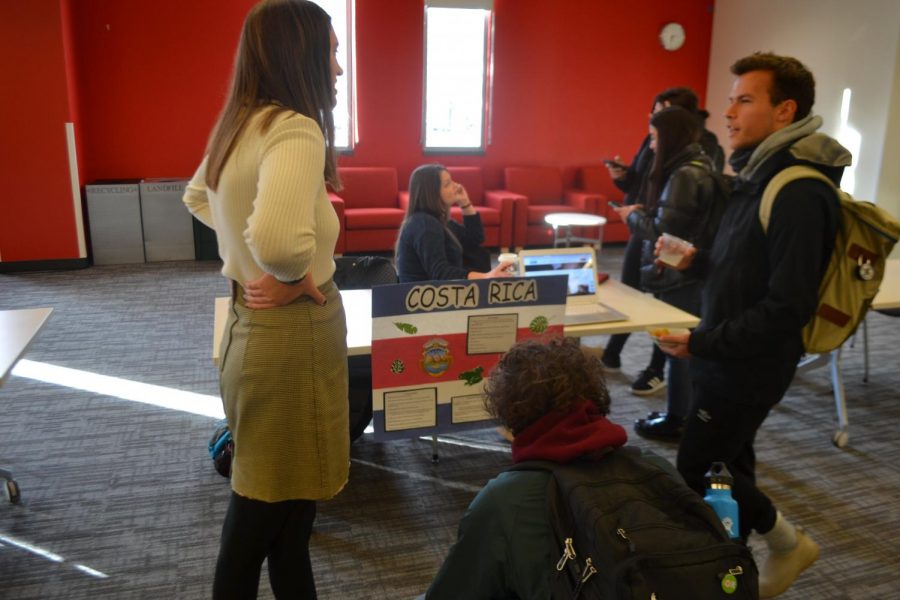Latin America comes to Hamline
Students host Hamline’s first Spanish-speaking International Fair.
Attendees spend time talking with students about various spanish culture
November 30, 2019
In order to learn more about the culture of Latin American countries and the issues they face, staff members, students and Spanish enthusiasts gathered together in Anderson for an International Fair showcasing 11 Spanish-speaking countries on Nov. 21.
“The fair was designed by students. In order to participate, they developed their resume in Spanish, applied for a job and had interviews,” teaching assistant Agustina Borré said, one of the event’s organizers. “We had the categories Treasury, Design/Advertising, Communication/Media, General Managers and Logistics.”
Students in Borré’s Spanish for the Professional class developed all the presentations at the fair.
“We worked the whole semester basically; on our applications, presentations and research for the fair,” first-year Ana Ortiz said, one of the participating students. “We want to show our findings to other people, to make them aware of the situations and problems.”
Throughout the last months, they studied different Latin American countries and investigated social issues and problems for the event.
“We also inform about organizations, to whom you can donate money to help improve the situation,” first-year Jiahui Ma added, Ortiz’s fellow representer of the country Colombia.
The countries were each represented by a table at the fair. Visitors could learn more about the cultures and especially the issues Spain and various Latin American countries are facing.
“Look at Chile, for example, the situation is really critical,” Borré said.
People in Chile are demonstrating against the economic situation and lack of jobs. In recent months the protests and government responses have gotten more and more violent.
“The conflict has been piling up for long,” Borré said. “Chile has a history of underpaid work, jobs under the table and privatization of education. Most people are at the base of the income pyramid, they don’t see that they stand any chance. Especially when they don’t see change, there are no options. This year there was a fifth increase in transportation fees, that was the last straw.”
Each of the 11 countries is facing its own problems and challenges right now. At each table, visitors could watch presentations and see collages about each country. Their questions could be answered in Spanish and English.
According to senior Mariana Garcia, the organizers achieved their goal.
“I liked it, it was a really nice event,” Garcia said. “People in the US often don’t know much about Latin America. This is a good way for them to understand more about the cultures and problems that are going on. It’s also nice that people are actually speaking Spanish here.”
Borré valued the learning aspect of the Fair.
“I would want to have events like this in our Spanish classes,” Borré said. “This is the best way to genuinely learn the language. Students are speaking Spanish in a real context, they see it in use, as a whole and with a cultural component.”
The students’ efforts seem to have paid off; both organizers and visitors considered the International Fair to be a great success as a learning experience.
“I’m not going to be at Hamline next year,” Garcia said. “Otherwise you would definitely see me here again.”

